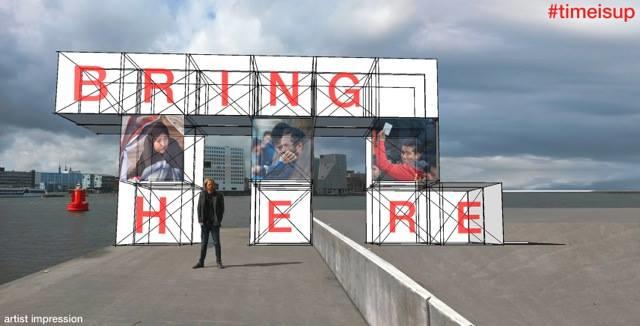

Time is up - Bouw een brug #Manifestatie
Wanneer: 30/09/2017 - 11:00
Time is up - Bouw een brug #Manifestatie
Openbaar · Georganiseerd door Let's Bring Them Here en 2 anderen

[English Below] Op zaterdag 30 september bouwen we middenin de hoofdstad een halve brug richting Athene. Tegelijkertijd bouwen vluchtelingen en Europeanen een halve brug in Athene. Om 17u luiden we in heel Europa de noodklok, want Time is Up. Een initiatief van SickOfWaiting in samenwerking met o.a. We Gaan Ze Halen
De Europese lidstaten beloofden vóór eind september 2017 bijna 60.000 vluchtelingen uit Griekenland en Italie over te nemen. Daar is maar weinig van terechtgekomen en de nood in de kampen is onveranderd hoog.
Programma:
11 uur - bamboe brug bouwen
17 uur - toespraak en luiden noodklok (neem alle bellen en klokken mee die je kan vinden)
17.30 - samen brug afbouwen
19.30 - naborrelen
Locatie: Tussen het EYE-filmmuseum en het IJ-water
Saturday, 30 September we will build half a bridge in the capital of the Netherlands, pointed towards Athens. At the same time in Athens refugees and European citizens will build half a bridge as well. ETA 5 pm we will ring all the bells we can find, because Time is Up. An initiative of SickOfWaiting in cooperation with We Gaan Ze Halen
European memberstates promised to relocate almost 60.000 refugees from Greece and Italy before September 2017. They didn't even come close to fullfilling this promise. The misery in the camps is still unchanged.
Programm
11.00 am _ building bamboo bridge
0.05 pm _ speech and ringing clocks and bells and everything (BYO!)
05.30 pm - building down the bridge
07.30 pm - having a drink

EU: Countries have fulfilled less than a third of their asylum relocation promises
European countries have utterly failed to fulfil their commitments to relocate asylum-seekers from Greece and Italy, Amnesty International said, as the two year period in which asylum-seekers are eligible for the relocation scheme closed on 26 September 2017.
“Two years after this scheme was agreed, most EU member states have fundamentally failed refugees and asylum-seekers, shirking their responsibilities and leaving thousands abandoned in Italy and Greece,” said Iverna McGowan, Director of the Amnesty International European Institutions Office.
“This isn’t about paying lip service to doing right by refugees and asylum-seekers, it is a legal obligation. EU countries must now step up and make good on the promises they made, or risk being taken to the European Court and potentially facing tough penalties.”
Among the worst offenders are Poland and Hungary, both of which have refused to accept a single asylum-seeker from Italy and Greece. Slovakia, which unsuccessfully challenged the relocation scheme in the European Court, has only accepted 16 of the 902 asylum-seekers it was assigned, and the Czech Republic only 12 of 2691.
Spain has fulfilled just 13.7% of its quota, while Belgium has fulfilled 25.6%. The Netherlands has fulfilled 39.6% of the target it committed to, and Portugal 49.1%.
Malta is the only EU country that has fulfilled its quota. Norway and Lichtenstein opted in to the scheme voluntarily, and have both fulfilled their commitments to relocate 1500 and 10 respectively.
Notably, Finland has welcomed 1,951 asylum-seekers (or 94% of its legal commitment). Ireland has taken in 459 asylum-seekers, or 76.5% of its legal commitment.
Amnesty International is calling on European governments to step up their efforts to fulfil their quotas under the relocation scheme, as well as to accept individuals with protection needs in Italy and Greece through other means, including through work visas and swift family reunification procedures.
The relocation scheme, agreed in September 2015, offered asylum-seekers the chance to rebuild their lives in safety after surviving war and persecution and then perilous journeys to reach Europe. In Greece, where thousands of asylum-seekers without family reunification claims have been trapped since the closure of the Greek-Macedonian border in March 2016, relocation has been one of very few formal options available for most people to safely move elsewhere in Europe.
Asylum-seekers who arrived on the Greek islands since the EU-Turkey deal was agreed on 20 March 2016, have unlawfully been excluded from the relocation scheme, and many remain trapped on the islands.
‘Everybody who arrives in Greece and Italy before the impending deadline should be made eligible for relocation. As well as allowing them to carry on with their lives in safety and dignity, making these people eligible would relieve pressure and improve conditions on the Greek islands, which have deteriorated as arrivals have risen over the summer months,” added Iverna McGowan.
After the deadline for asylum-seekers to become eligible for the relocation scheme passes, governments can, and must, continue to relocate those already eligible, in line with their obligations.